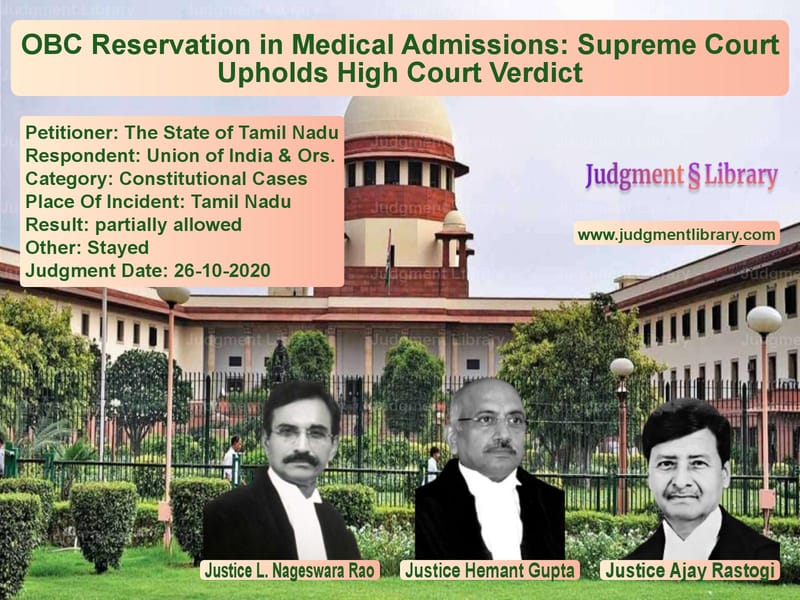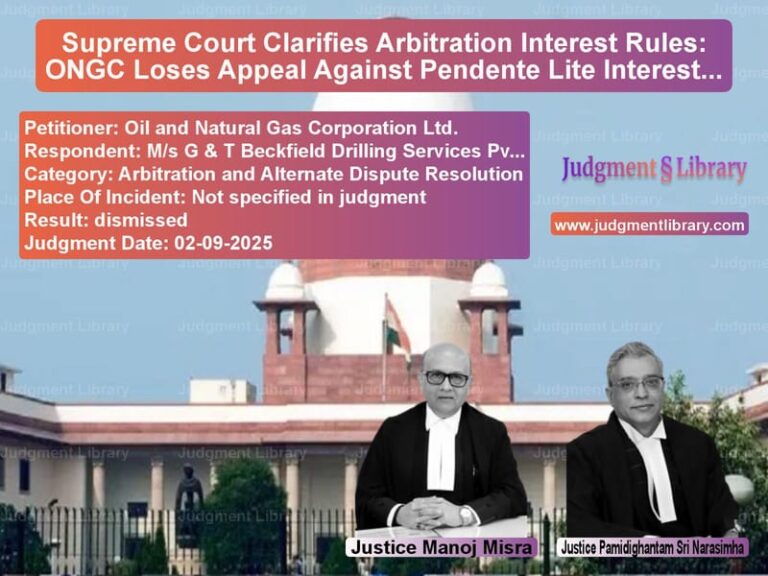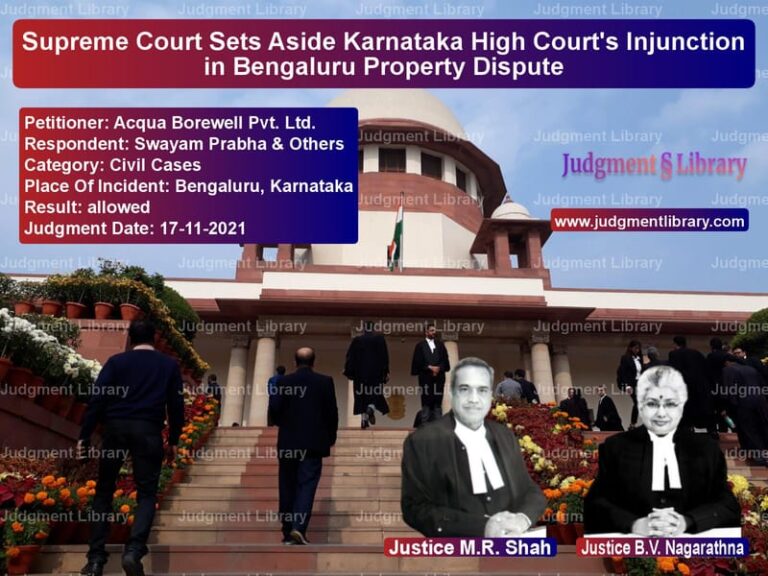OBC Reservation in Medical Admissions: Supreme Court Upholds High Court Verdict
The case of The State of Tamil Nadu vs. Union of India & Ors. is a crucial ruling by the Supreme Court of India concerning the implementation of Other Backward Classes (OBC) reservation in medical seats surrendered to the All India Quota (AIQ) by the State of Tamil Nadu. The Court addressed the legal and procedural challenges regarding whether OBC reservation could be applied to the AIQ in government medical colleges for the academic year 2020-21.
The judgment reaffirms that while OBC reservation is a fundamental right under Tamil Nadu’s reservation laws, its implementation in AIQ requires a coordinated effort between the Union Government, State Government, and the National Medical Commission. The ruling maintains the status quo for the 2020-21 admissions while setting the framework for future implementation.
Background of the Case
The dispute arose when the State of Tamil Nadu and various petitioners filed writ petitions before the Madras High Court seeking enforcement of OBC reservation in AIQ seats of government-run medical institutions. Tamil Nadu has a long-standing reservation policy under the Tamil Nadu Backward Classes, Scheduled Castes and Scheduled Tribes (Reservation of Seats in Educational Institutions and of Appointments or Posts in the Services Under the State) Act, 1993 (1993 Act), which mandates 50% reservation for OBC candidates in medical education.
Key aspects of the case:
- The Tamil Nadu government implemented 69% reservation in state-run institutions but was unable to apply it to AIQ seats due to central regulations.
- The AIQ, consisting of 15% UG and 50% PG seats in government medical colleges, is administered by the Medical Counseling Committee (MCC) of the Directorate General of Health Services (DGHS).
- OBC candidates were being denied reservation in these AIQ seats outside of Central Educational Institutions.
High Court Judgment and Supreme Court Appeal
On 27 July 2020, the Madras High Court ruled that OBC reservation should be implemented in AIQ seats from the next academic year. However, it declined to interfere with the ongoing admission process for the 2020-21 academic session, citing concerns about disrupting the selection process.
The State of Tamil Nadu and other petitioners challenged this decision before the Supreme Court, arguing that OBC reservation should be implemented immediately and not be postponed.
Petitioner’s (State of Tamil Nadu) Arguments
The petitioners, represented by senior counsel V. Giri and Additional Advocate General Balaji Srinivasan, argued:
- The 1993 Act applies to all medical seats, including AIQ seats surrendered by the State.
- The Union Government and MCC had failed to provide a clear policy on OBC reservation.
- Since PG admissions were already completed, UG admissions should immediately reflect OBC reservation.
- The stand of the Union Government before the High Court supported OBC reservation, making its delay unjustified.
Respondents’ (Union of India & Medical Commission) Arguments
The Union Government, represented by Additional Solicitor General Balbir Singh, and the National Medical Commission (formerly Medical Council of India), represented by Gaurav Sharma, countered:
- AIQ UG and PG admissions follow national merit-based counseling with a uniform reservation policy.
- Seats are allocated through the NEET merit list under MCC’s online counseling.
- OBC reservation applies to Central Educational Institutions but has not been implemented in State-surrendered AIQ seats.
- Changing seat allocation rules after the admission process has started would disrupt counseling.
Supreme Court’s Observations and Judgment
The Supreme Court, led by Justices L. Nageswara Rao, Hemant Gupta, and Ajay Rastogi, made the following key observations:
- Reservation is Constitutionally Valid: The Court acknowledged that the 1993 Act allows OBC reservation and can be applied to AIQ.
- Implementation Requires Policy Coordination: A joint effort between the Centre, State, and the Medical Commission is necessary to formalize OBC reservations in AIQ.
- Existing Admission Process Cannot Be Disrupted: The Court emphasized that changing the rules mid-admission could cause logistical issues and create confusion among candidates.
- Future Implementation Assured: The Committee appointed by the Union Government is actively working on modalities for implementing OBC reservation in AIQ from the 2021-22 academic year.
Final Judgment
The Supreme Court ruled:
- OBC reservation in AIQ is valid and should be implemented.
- Immediate implementation for 2020-21 is not feasible as the counseling process had already commenced.
- The policy for OBC reservation in AIQ must be finalized before the next academic year (2021-22).
- The Union Government must ensure that future AIQ admissions reflect OBC reservation.
Conclusion
The Supreme Court’s decision strikes a balance between the principles of social justice and procedural fairness. While upholding the right to OBC reservation, the ruling acknowledges the need for a structured approach to implementation. The verdict sets the stage for OBC students to benefit from AIQ seats in medical colleges from the next academic year while preventing disruption to the current admission cycle.
Petitioner Name: The State of Tamil Nadu.Respondent Name: Union of India & Ors..Judgment By: Justice L. Nageswara Rao, Justice Hemant Gupta, Justice Ajay Rastogi.Place Of Incident: Tamil Nadu.Judgment Date: 26-10-2020.
Don’t miss out on the full details! Download the complete judgment in PDF format below and gain valuable insights instantly!
Download Judgment: The State of Tamil N vs Union of India & Ors Supreme Court of India Judgment Dated 26-10-2020.pdf
Direct Downlaod Judgment: Direct downlaod this Judgment
See all petitions in Fundamental Rights
See all petitions in Public Interest Litigation
See all petitions in Judgment by L. Nageswara Rao
See all petitions in Judgment by Hemant Gupta
See all petitions in Judgment by Ajay Rastogi
See all petitions in partially allowed
See all petitions in Stayed
See all petitions in supreme court of India judgments October 2020
See all petitions in 2020 judgments
See all posts in Constitutional Cases Category
See all allowed petitions in Constitutional Cases Category
See all Dismissed petitions in Constitutional Cases Category
See all partially allowed petitions in Constitutional Cases Category







